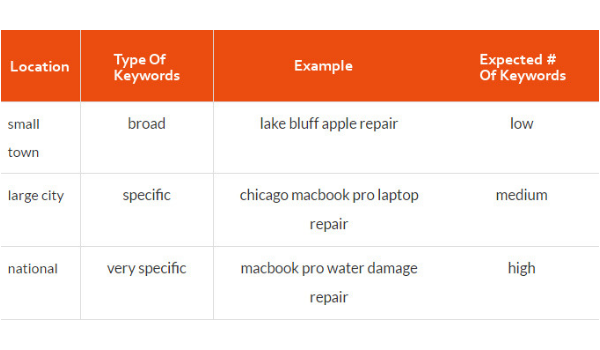From the get-go, Google has been tactful at keeping everyone on their toes with every algorithm update. But if there’s one thing that isn’t bound to change in the foreseeable future, it’s inbound marketers optimizing their websites for keyword search.
The Keyword Research
The chances of being noticed all begin with words that you type into a search box.
Keyword research is one of the most valuable, important, and ROI-generating activities in the marketing field. Ranking for the right keywords determines your place in the search engine result pages.
In researching search terms that people enter into search engines, you, as the marketer, not only begin the path to understanding your customers, but your knowledge in these actual search terms can help you and your team determine content strategy — even marketing strategy overall.
For seasoned content writers and inbound marketers, keyword research is a process that will never get old. So for beginners to neglect its importance is simply irrelevant.
With the right process to undertake in your keyword research, you’ll be able to establish and execute a strong keyword strategy that will help you rank on top of SERPs.
Create a list of topics relevant to your business
Based on what you know about your company, start thinking about the topics you want to rank for on search engines.
You can try coming up with at least 5-10 topics, and those topics will help you come up with specific keywords later on.
To make this step easier, put yourself in the shoes of your target audience. In a business like yours, what would your target audiences want to see from you? What do they want to read about?
If you’re a company that markets events planning, for instance. Your general topics can include wedding events, birthdays, conferences, graduations, etc.
Choose long-tail keywords

The most common mistakes that experts can spot is the mistake of choosing a very general term as the focus keyword. Say, wellness, weight training, baking cookies, the iPhone X, etc.
Most, if not all, single terms are generic. And frankly speaking, you don’t want to create content for a keyword that you have no chance of ranking for.
So for small businesses who are just beginning their marketing strategies, the best and safest option is to focus on incorporating long-tail keywords — and specific ones, at that.
Long-tail keywords are easier to rank for and typically have 3 or more words in the phrase. Furthermore, long-tail keywords attract targeted visitors. (If you’ve been around marketing a while, then you know it’s difficult to attract a general audience).
Research related search terms

An age-old technique that everybody uses is Google’s autocompleting function.
In retrospect, you’ve probably already thought of utilizing Google’s autocomplete function for keyword research purposes.
If you’re struggling to think of more keywords that people are searching for, just go to google.com. Type in a keyword, and wait for Google to complete the phrase for you.
The keywords Google will list might even spark ideas for other keywords you probably never considered before.
Crassly speaking, go nuts in your research on related terms. Check the singular and plural forms of your keywords, rearrange the words, or place an underscore in the middle of a phrase and see what Google comes up.
And if you really want to go in-depth into your keyword research with Google’s autocompleting function, type in the related search terms and look at their related search terms.
Don’t compete with authority websites
Don’t make the naive mistake of trying to dethrone or outrank websites that hold superior domain authority. (Wikipedia, Amazon, Google, Yelp, etc.)
But when opportunity knocks, it would be a shame to turn her down now, wouldn’t it?
You can compete with these sites if they’re doing a poor job of covering a topic you’re interested in covering for.
Check your competitors
In the field of marketing, it’s a competition — a race against who attracts the target audience first. And in competitions where the cards are on the table, isn’t it only reasonable to scope out your competition as well?
Yes, it’s true that there are times when your competitors’ keywords don’t matter to you at all. But in understanding which keywords your competitor is trying to rank for is a good way for you to evaluate your own list of keywords.
Remember, however, that your goal is to end up with a list of keywords that will give you quick wins, and at the same time, pave the way for progressing towards more challenging SEO and marketing goals.
Make use of Google Keyword Planner and Google Trends

After determining the right mix of keywords, it’s time to bolster the amount of qualitative data with quantitative ones.
There are other tools you can use to formulate keywords, but the main one we’ll talk about is Google AdWords Keyword Planner and Google Trends.
In the Keyword Planner, you can see the search volume and traffic estimates for keywords that you’re thinking of.
Meanwhile, Google Trends is useful for telling about the keywords’ trend history — on whether or not you should invest in these keywords and reap other benefits later on. Google Trends can also help you determine whether some of these terms are trending upwards.
Other tools you can utilize for keyword research and planning include:
- MozBar
- Ahrefs
- BuzzSumo
- HubShout WebGrader
- Moz Keyword Explorer
Take local keywords into account

According to SEO expert, Tom Dupuis:
“The larger the area, the more specific your keywords will be, and the more you will have. Smaller towns will have broad keywords while larger cities will have more specific phrases…”
Huge cities tend to have multiple specific keywords…

And of course, national keywords are more specific, and there are more of them…
Target lots of keywords
Relying on one keyword as your only source of traffic is a huge mistake. It’s a big no-no too…
Unless you’re targeting a very small and specific small town and your keyword is tailored for that town only, then you should prepare plenty of keywords in your arsenal. Moreover, you should also be looking to target as many as possible.
Don’t forget to evaluate
If you want to rank for certain terms, don’t forget to evaluate your progress in the long-run. Keep track of how your keywords are doing and learn from the data they give to you.
You need to constantly check if people are actually finding your articles as they should be. So, don’t tire of ‘googling’ your proposed focus keywords every now and then.
The EndNote
Marketing, in general, isn’t a walk in the park. That goes without saying that the execution of keyword research won’t be as simple as looking at statistics alone.
If your target is to truly rank on search engines, a lot of time, brainstorming, and researching should be invested. There’s a lot of short-term and long-term gains to be had from putting considerable effort into thorough keyword research.
And at the very bottom line of it all, don’t forget to reevaluate every now and then, and track your keywords’ progress. Put yourself in your audience’s shoes and think about who they are and what they want from you. Keep all of that in mind, and you won’t go wrong.
Al Gomez is the President and Founder of Dlinkers — a company dedicated to providing complete digital marketing services. With more than ten years of experience, he enjoys supporting smartpreneurs like himself to achieve online success.
 CoalesceIdeas Web and graphic design ideas for inspiration
CoalesceIdeas Web and graphic design ideas for inspiration




